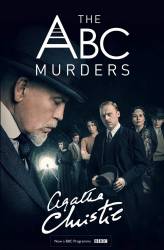Continuity mistake: The only letter that Alexander B. Cust really wrote himself is briefly shown when Poirot visits the office of the Twinkle Toes stocking company. The lowercase "R" is too high every time (meaning that the typewriter isn't perfect, a detail put in for realism). Yet all the close-ups of a typewriter progressing through the work on that letter, or any of the letters written on the same machine, show a perfectly aligned "r."
Episode #1.1 - S1-E1
Factual error: This is set in 1933. When the killer comes back to his lodgings in episode 1, Lily on the stairs is humming "Somewhere over the rainbow", which was written for The Wizard of Oz in 1939. She also happens to wear bright red shoes, which feels like yet another Wizard of Oz reference. Interesting enough, the subtitles say that she is humming a different song, "Night and day" which she openly sings throughout the series and was already a hit in 1932. (00:44:10)
Episode #1.3 - S1-E3
Continuity mistake: Poirot is talking to the owner of Twinkle Toes and confirms that indeed the victim was strangled with his merchandise. The man listens with his fingertips adjoined and pointed towards Poirot, but when it cuts to his response ("Poor kid") his left hand is partially in frame and in a different position altogether. (00:17:50)
Episode #1.3 - S1-E3
Factual error: On the train, Franklin Clarke is perusing the racing news. The episode is set in 1933, but the horses mentioned in the page he's reading, such as Astley Wood, Garcette, Incense Boy, were active only years later, racing in Bath (the programme he's looking at) in 1938-39. (00:34:00)
Episode #1.3 - S1-E3
Other mistake: After the arrest of "ABC" and a brief scene with the interview to Betty's family, there's a prolonged close-up of a newspaper with the date "24 April 1933." Besides the article on the serial killer, there's a headline that says "German ministers in Rome - Uproar as Strong Arm men pack benches." The body of the article though talks about the Persian parlament, and the prime minister mentioned is "Dr. Mossadeg." Mohammad Mossadegh's public office as PM and his visit in the US mentioned in the article happened in the 50s.





